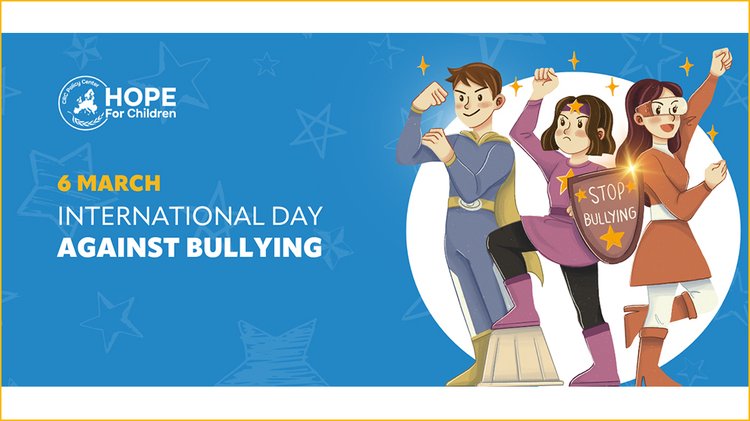International Day Against Bullying: 1 in 4 students admits to being a victim of bullying in Cyprus
09:16 - 06 March 2024

“Hope for Children” CRC Policy Center is marking the International Day Against Bullying on 6 March, shedding light on the escalating phenomenon that has been rising in Cyprus, as confirmed by the comprehensive research study that has been conducted to analyse the prevalence of violence in Cyprus.
Bullying can be defined as an “aggressive, repeated, intentional behavior involving an imbalance of power aimed toward an individual or group of individuals who cannot easily defend themselves” (Vaillancourt et al., 2008).
Research has shown that bullying affects the general well-being of those involved and is associated with severe symptoms of mental health problems, low self-esteem, academic challenges and persistent psychological stress. These include self-harm and suicidality, difficulties concentrating, headache, stomach pain, feeling tense, sad and/or dizzy, sudden mood changes, disturbances in sleep patterns, and an inclination to withdraw from social interactions.
There are different types of bullying: Physical, Verbal, Emotional and Cyberbullying. Physical bullying involves physical acts of aggression or violence, such as hitting, kicking, pushing, or damaging someone's property. Verbal bullying includes using words to hurt, intimidate, or belittle others through name-calling, insults, teasing, or spreading rumors. Emotional bullying, also known as psychological bullying, involves manipulating, isolating, or excluding individuals to undermine their self-esteem and mental well-being. Cyberbullying occurs through electronic means, such as social media, text messages, emails, or online forums, and involves harassing, humiliating, or threatening others anonymously or publicly.
Although physical and cyberbullying are often of greatest concern, social and verbal bullying are the most common forms students experience and the most difficult to identify.
As part of the ongoing National Strategy for Prevention and Management of School Violence (2018-2024), a comprehensive research study has been conducted to analyse the prevalence of school violence in Cyprus. The latest findings from this longitudinal study, which was supervised by University of Cyprus psychology professor Kostas Fantis, spanning from 2019 to 2024, unveiled in October 2023, revealed that 1 in 4 students admits to being a victim of bullying, both within the school context and online, indicating a distressing escalation of this issue over the past three years. Key highlights from the research include the continued observation by over 95% of educators of instances of violence among students, emphasising the pervasive nature of the issue within school settings. Additionally, it reveals that 1 in 5 teenagers falls victim to cyberbullying, aligning with broader European data on digital harassment. Moreover, the research indicates that one in ten children experiences marginalisation, further emphasising the urgent need for targeted interventions and support mechanisms. Surprisingly, more than half of students adopt a passive bystander role during incidents of school violence, with only 18% actively defending or comforting victims. These findings underscore the critical imperative to address and combat school bullying effectively.
When it is determined that a child has been a victim of bullying, it is imperative that parents and teachers take immediate and decisive action to address the situation. This includes listening and offering support to the child, reporting to school authorities, documenting incidents, seeking professional help if necessary, encouraging open communication, teaching coping strategies, and fostering a culture of respect and empathy. By taking these proactive steps, we can create a safer and more supportive environment for all children, ensuring that every child feels valued, respected, and empowered to thrive.
“Hope For Children” CRC Policy Center conducts experiential workshops for the prevention and handling of school bullying. Two of the programs offered are “Beat Bullying” which educates students, through non-formal education, to deal with the phenomenon and the operation of CRC Clubs in schools where the aim is for children to be educated about their rights and responsibilities that are set out in the Convention on the Rights of the Child and to act as Ambassadors of the Rights of the Child in their schools.
Simultaneously, the Organisation in cooperation with SPAVO operates the European Helpline for Children and Teenagers 116111, which enables all children to call for free and anonymously to receive guidance and psychological support services. Additionally, the Organisation offers free psychological and counselling services for children and parents, as well as remote guidance via the national support line 1466.
For further information about the programs and services of “Hope For Children” CRC Policy Center you can communicate by calling 1466, as well as through the 24/7 online platform www.uncrcpc.org.cy.
